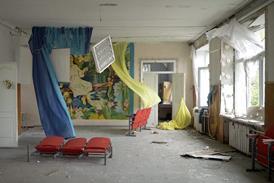Dir: Jafar Pahani. Iran. 2006. 88mins.
Destined to be referred to as a Farsi Bend It Like Beckham, Jafar Panahi's football story Offside is his most approachable filmsince The White Balloon, which puthim on the map in 1995.
Essentially a realistcomedy, this digital ensemble piece is also bitterly outspoken about thetreatment of woman in Iranian society, but handles the theme in a much lightervein than Panahi did in his harrowing 2000 drama The Circle.
Shot at a real-life footballmatch, with thousands of fans standing in as extras, Offside is a vibrant, poignantand angry piece that should win support and sales worldwide, especially withthe World Cup in the offing.
The film is set in andaround a Tehran football stadium on the day of a big Iran-Bahreinmatch - the outcome of which will decide whether Iran qualifies for World Cup(in both film and reality, Iran won).
The film starts on two busesheading for the match, crammed with young male fans - and a handful of females,heavily disguised to get into the match. Women are banned from attendingfootball matches in Iran, where it is thought improper that they should mixwith men and be exposed to coarse language.
Thus, female fans will doanything to see a game, sometimes at great peril to themselves;by the end of the film, a group of young women are being transported to facethe Vice Squad, while another, who has ingeniously dressed as a soldier, pointsout that she is narrowly escaping execution.
Even with these risks inmind, several young women find their way into the stadium, sometimes with thecomplicity of sympathetic men - only to be apprehended and placed in a holdingpen for the duration of the match.
While there, they variouslybemoan their fate, taunt the ineffectual and embarrassed soldiers who arekeeping an eye on them, and contrive different ways to find out what'shappening on the pitch.
One woman, on the excuse ofa toilet break, manages to make it briefly into the stands, while her confusedguard is detained by some angry fans.
The match itself is barelyglimpsed, but the stadium crowd is both visible and very vividly audible, andfilm ends with footage of real-life celebrations of Iran's victory.
As an audacious piece offast-and-furious digital film-making, the film scores a notable success inbeing shot during the actual match in which the drama unfolds.
A non-professional cast,sometimes improvising, is engagingly energetic, and the film is altogether somuch fun that it's almost - but not quite - possible at moments to forget that Panahi's statement about Iranian culture here is every bitas impassioned and angry as his previous work. Even non-sporting audiencesshould take it to heart.
Production company
Jafar Pahani
Khiyabane Fereshteh
Khiyabaneh Vali Assr
Kouche Bon Basteh Ekhtesadi
International sales
Celluloid Dreams
Producer
Jafar Pahani
Cinematography
Mahmood Kalari
Screenplay
Jafar Panahi
Shadmehr Rastin
Editor
Jafar Panahi
Production design
Iraj Raminfar
Main cast
Sima Mobarek
Safar Samandar
Shayesteh Irani
M Kheyrabadi



















No comments yet